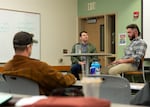
Lindsey Nikkel shakes John Graham's hand at the end of the STRIVE program in Bend, Ore., on Mar. 4, 2025. Nikkel won $2,000 to support her business venture.
Kathryn Styer Martínez / OPB
Keith Sherrill joined the U.S. Army at 17, shortly after the 9/11 terrorist attacks. By the time he left 14 years later, he had been on nine combat deployments to Iraq and Afghanistan with elite teams like the 75th Ranger Regiment and the 160th Special Operations Aviation Regiment.
“For most of my adult life, I was covered in dirt or I smelled like jet fuel,” Sherill said.
Transitioning back to civilian life was hard, he said, because “I had every idea and no idea at the same time.”
He decided to open a brewery where he grew up in Alabama and learned firsthand how intense it can be to run a small business.
“I can tell you that the financial woes of being an entrepreneur are equally scary and feel in many ways just as visceral as a wartime experience.”
His own learning curve was part of why he wanted to become a teacher for veterans developing small businesses and bring a national program called STRIVE to Central Oregon Community College in Bend.

Keith Sherrill (left) talks with Barak Robinson during one of the STRIVE class sessions at the Central Oregon Community College campus in Bend, Ore., on Feb. 11, 2025. Robinson shared his journey from working in the military to becoming an entrepreneur.
Kathryn Styer Martínez / OPB
STRIVE stands for Startup Training Resources to Inspire Veteran Entrepreneurship. The free eight-week business education course is available to military veterans and spouses. It’s part of the D’Aniello Institute for Veterans and Military Families, or IVMF, at Syracuse University in New York.
It was developed to help veterans learn how to launch or improve their small businesses, but Sherrill said the mission goes deeper than that. The program helps people refine their purpose, job and tribe.
Being a small business owner and serving in the military share many aspects, according to Sherrill.

Keith Sherrill, 40, watches a student pitch their business idea during the final class meeting at the Central Oregon Community College campus in Bend, Ore., on Mar. 4, 2025.
Kathryn Styer Martínez / OPB
Optimism is especially important for either activity, he said.
COCC is one of just nine partner institutions in the country to offer the STRIVE program, most of which are community colleges. The national footprint targets areas with above-average numbers of military veterans, and where formal business education can be difficult to access.
“Not everyone can get to a large hub city or not every community has a lot of the resources that you might see in a larger city,” said Melissa Bird, an associate director at Syracuse University’s IVMF.
Part of the program’s mission is to help veterans “where they’re going to be living, where they’re going to be working, where their business is going to be supported the best,” she said.
Sherrill, 40, works as a small business management coordinator for the Small Business Development Center housed at COCC’s Bend campus. When COCC’s first cohort of 18 STRIVE students began the program in January, he served as their teacher.
Army and reserves veteran Kimberly Liszka said walking into the classroom full of fellow servicemembers was comforting.
“There’s that commonality and bonding right off the bat. And so there was such an ease to just being in that community again,” said the 51-year-old Bend resident.

Kimberly Liszka stands wrapped in a blanket on her porch in Bend, Ore., on Feb. 3, 2025.
Kathryn Styer Martínez / OPB
She’s a nurse, and after the military, she worked in emergency rooms for a total of around 20 years. When she was in the Army, she started out as a combat medic, before earning her degree and becoming trained as a combat then flight nurse.
Serving in the military was part of Liszka’s family story. Her dad and grandfathers served.
She left the military and then later took a break from nursing in part to heal from the intensity and trauma she experienced on the job. That inspired her to co-found the Reveille & Retreat Project to help military women process and heal from gender-specific trauma. The nonprofit offers workshops, retreats and a podcast, Dog Tag Diaries.
“I’ve learned that when you keep all that trauma stored inside of you, it does come out as physical ailments,” she said. “If we can have a platform for these women to get all that trauma out from inside, let’s do it.”
The STRIVE class helped her get over imposter syndrome and have more confidence in the business idea.

Justin Coats (left) and Lindsey Nikkel start a round of applause for Keith Sherrill at the end of the program in Bend, Ore., on Ma4. 4, 2025. Coats won the top prize at the event for his company Neesh.ai.
Kathryn Styer Martínez / OPB
At the end of the eight-week course, the students gathered to pitch their business idea to a panel of judges. A total of $10,000 was on the line for the top four pitches.
That night, the room was full of participants, their families, colleagues and other veterans who didn’t take the class but were there to support the program.
Liszka went first.
When she talked about her struggle with mental health. On the stage, her voice broke for just a moment, but she kept her flow to continue delivering a three-and-a-half-minute pitch. Later, she said it felt like she was on a mission to overcome her nerves and deliver her message.
“This confidence came over me, and I felt amazing afterwards,” she said.
As Sherrill closed out the night, the longtime combat veteran told the audience that teaching the class was one of the most fulfilling things he’d ever done.
“You heard everyone’s pitches,” he said, “they’re community leaders, they do the hard work, they represent us well — these are my people.”


